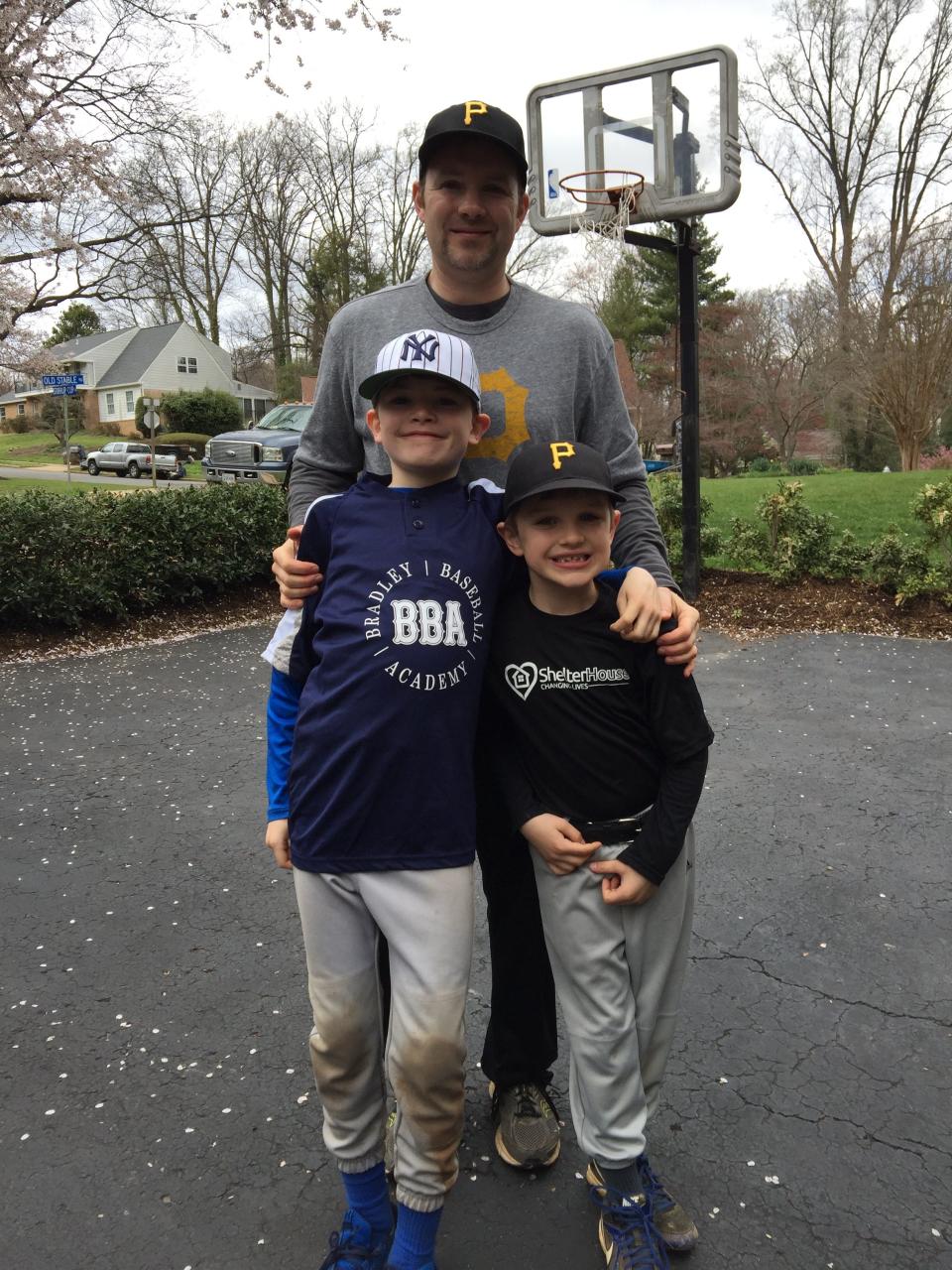Is your kid a good sport? Here's 3 lessons one high school athlete learned from his parents
When their son Grant is pitching for Meridian High School, you won’t often find Paige and Joe Greiner sitting together.
“I like to stand behind the opponents’ bleachers,” Paige said. “I don’t like to be around. I like to walk the dog a lot.”
Joe, her husband, is usually in his fold-up chair near the backstop.
“I just sit here quietly,” he said Wednesday at a road game for the Northern Virginia high school. “Very similar to what you see me doing now. I’ll toss out a couple of baseball banalities every now and then. 'Go get him.' Straight cheering and watching and enjoying.”
The setup works for them and fits with the philosophy of sportsmanship they've tried to uphold throughout their son's athletic growth. If you ask Grant, his parents taught him three basic things over the years that made him the type of athlete who is self-reliant and rarely spirals.
1. You always fail at some point.
"They taught me that," Grant said. "And you have to bounce back. Always keep going."
2. Always be a good sport.
"Win, lose, you still have to go out there and shake their hands," he said. "Keep playing.”
3. Never give up.
"That’s kind of what I’m going by right now," he concluded.
The Greiners spoke to USA TODAY Sports on a pleasant evening amid a jovial atmosphere that included organ music through a speaker. But two weeks ago, the night of March 15, was different. Their son was on the mound, but the wind was blowing and the temperature in the Washington, D.C., suburbs dipped into the 30s.
“We all appreciated that Grant was throwing strikes because it was so cold,” Joe said.
Grant, a junior, was throwing about three of four pitches for strikes. By the fifth inning of the game against Thomas Jefferson High, it became clear something even more exceptional might be happening. His teammates, upholding baseball tradition, tried not to make a big deal of it in the dugout.
The Mustangs take down Thomas Jefferson 10-0 tonight. Grant Greiner throws a perfect game, striking out 12 in a 69 pitch effort. Kozbelt, Downs, Duval first varsity career hits for the Stangs. The squad will host Seton on Friday. pic.twitter.com/7MfgTCZ5Cw
— MHS Baseball (@baseball_stangs) March 16, 2023
In 1956, the Yankees’ Don Larsen was setting down Dodger after Dodger in Game 5 of the World Series. He would follow teammate Mickey Mantle around the dugout in between innings and say: “Hey Mick, I’m pitchin’ a no-hitter here.”
“Gooney, get away from me,” Mantle had to tell him.
Grant instead heard whispers from teammates and got a couple of exclamatory high fives, but there was no jinxing him. Pretty soon, he had set down 18 hitters in a row, completing his perfect game, just like Larsen.
“It gave me a lot more confidence,” Greiner said. “It assured me all the hard work I’m doing helped. It works.”
Larsen was large and awkward, thus the nickname “Gooney Bird.” But at 6-4, 215 pounds, he found a no-windup motion in which he could step and fire balls past hitters. It was kind of how Grant pitched as a 12-year-old. But when he played travel ball, his coach wouldn’t pitch him. So, his parents enrolled Grant in what they described as a bare bones player development program. He had a young coach who demanded a lot of the kids.
“I think he really thrives on that structure,” Paige said.
Less than a year ago, Grant got into weight training. He’s now 6-3 ½ and 211 pounds. He goes to the gym after practice, or on Saturday nights. Last season, he started a Virginia state semifinal game as a sophomore. This year, he’s the Mustangs’ ace.
“It’s definitely an example of what you do in Little League is not indicative of what you’re gonna do in high school,” Joe says. “If you’re a Little League shortstop, you may end up being a first baseman or outfielder or catcher.”
Joe has coached Grant and his two younger brothers since they were young. He was in charge of the Positive Coaching Alliance program for their Little League. It’s an approach he and Paige always used with their kids.
“What I have found as a coach is the only thing that works is positive enforcement,” Joe said.
They gave Grant room to breathe and grow as an athlete. Joe admits having to rein himself in at times. He takes notes on his phone during Grant’s games but won’t tell him his assessment until a day or so later to "give him time to decompress."
Paige calls Grant “Pal” when she cheers (loudly), and makes him a protein shake and a snack before every home game. Grant has thrived, playing baseball and basketball (starting on varsity since he was a sophomore) with poise and confidence.
“He doesn’t spiral down into the dumps,” Paige said. “He’s very even. He doesn’t get super frustrated or super upset, which is easier on me to watch.”
When asked what she’s most proud of about Grant, she says: “He requires very little from us. He does everything on his own. … He’s so much better than he thinks he is. And maybe that’s a parent talking.”
She laughs, like Joe does when you ask him if he thought Grant was superstitious during the perfect game.
“I don’t know if he’s superstitious,” he says. “I think he’s just hungry.”
Steve Borelli, aka Coach Steve, has been an editor and writer with USA TODAY since 1999. He spent 10 years coaching his two sons’ youth teams. He and his wife, Colleen, are now loving life as sports parents for a high schooler and middle schooler.

This article originally appeared on USA TODAY: Be a good sport! Teach your kid these 3 lessons in sportsmanship

